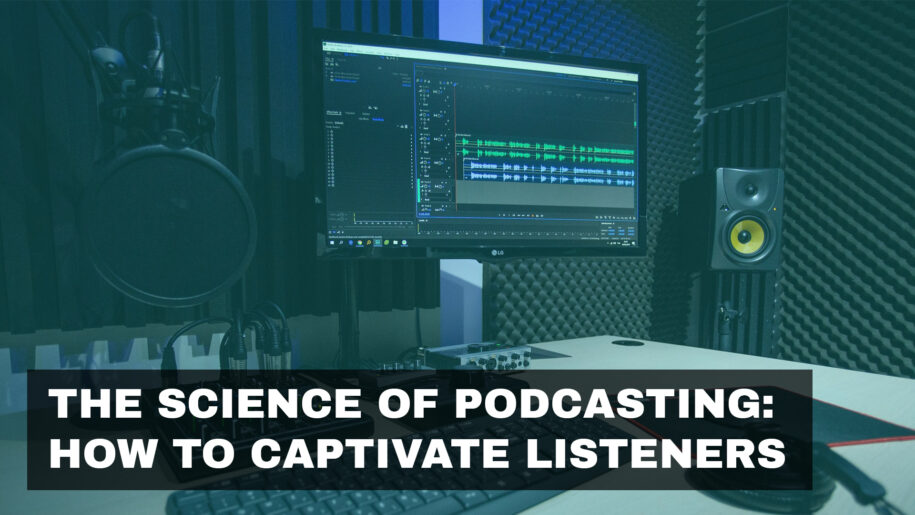Podcasting is both an art and a science. While creativity and storytelling are crucial, understanding the science behind what captivates listeners can take your podcast to the next level. This post delves into the scientific principles that can help you engage your audience and keep them coming back for more.
1. Understanding Attention Span
In today’s fast-paced digital world, capturing and maintaining listeners’ attention is a challenge. Research suggests that the average adult’s attention span is around 8 seconds. Here’s how you can make the most of this:
Start Strong: Begin your podcast with a hook that grabs attention immediately. This could be a provocative question, a surprising fact, or a compelling story.
Maintain Pacing: Keep the pacing of your podcast brisk and dynamic. Avoid long monologues or overly detailed explanations that can cause listeners to lose interest.
2. Crafting Engaging Content
Content is king in podcasting. To keep listeners engaged, your content needs to be relevant, interesting, and well-structured:
Storytelling: Humans are wired to respond to stories. Craft your episodes around compelling narratives with a clear beginning, middle, and end. Use real-life examples and personal anecdotes to make your stories relatable.
Emotional Connection: Studies show that people are more likely to remember and engage with content that evokes emotions. Whether it’s humor, empathy, or curiosity, aim to elicit emotions in your listeners.
Value Proposition: Ensure that each episode provides value to your audience. This could be in the form of education, entertainment, inspiration, or practical advice.
3. The Role of Sound Quality
Sound quality plays a critical role in listener retention. Poor audio quality can be distracting and lead to listener drop-off:
Invest in Good Equipment: High-quality microphones, headphones, and audio interfaces can make a significant difference in sound quality.
Editing and Post-Production: Use audio editing software to remove background noise, balance audio levels, and enhance clarity. Techniques like equalization and compression can help achieve a polished sound.
Sound Design: Incorporate music, sound effects, and ambient sounds thoughtfully. These elements can enhance the listening experience and make your podcast more immersive.
4. Leveraging Psychology
Understanding psychological principles can help you design a podcast that resonates with listeners:
The Power of Repetition: Repetition helps reinforce key points and makes them more memorable. Recap important information at the end of each episode and across multiple episodes.
The Zeigarnik Effect: This psychological principle suggests that people remember incomplete or interrupted tasks better than completed ones. Use this to your advantage by creating cliffhangers or teasing future content to keep listeners coming back.
Social Proof: Highlight testimonials, reviews, and listener feedback in your episodes. Social proof can build credibility and encourage new listeners to tune in.
5. Engagement and Interaction
Engaging with your audience beyond the podcast can deepen their connection to your content:
Call to Action: Encourage listeners to subscribe, leave reviews, or follow you on social media. Make your calls to action clear and compelling.
Community Building: Foster a sense of community by interacting with your audience on social media, hosting live Q&A sessions, or creating a dedicated forum or group for listeners.
Listener Involvement: Invite listeners to contribute questions, stories, or feedback. Featuring listener contributions in your episodes can make your audience feel valued and involved.
6. Consistency and Reliability
Consistency is key to building a loyal audience. Research shows that people are more likely to engage with content that is regularly updated:
Regular Schedule: Release episodes on a consistent schedule, whether it’s weekly, bi-weekly, or monthly. Consistency helps establish trust and reliability with your audience.
Content Planning: Plan your content in advance to ensure a steady stream of high-quality episodes. A content calendar can help you stay organized and on track.
The science of podcasting involves understanding and leveraging various principles to captivate and retain listeners. By focusing on attention span, crafting engaging content, ensuring high sound quality, leveraging psychology, engaging with your audience, and maintaining consistency, you can create a podcast that not only attracts listeners but also keeps them coming back for more. Embrace these scientific insights and watch your podcast thrive.


